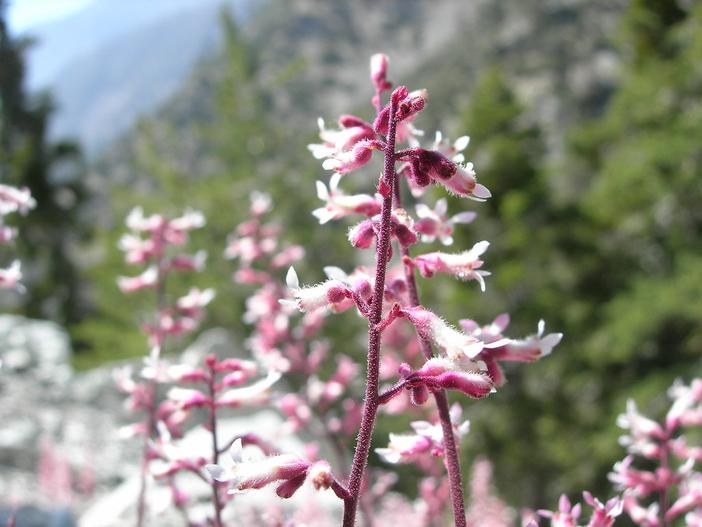Tufted Alumroot
(Heuchera caespitosa)
Tufted Alumroot (Heuchera caespitosa)
/
/

Joe Decruyenaere
CC BY-SA 2.0
Image By:
Joe Decruyenaere
Recorded By:
Copyright:
CC BY-SA 2.0
Copyright Notice:
Photo by: Joe Decruyenaere | License Type: CC BY-SA 2.0 | License URL: https://creativecommons.org/licenses/by-sa/2.0/ | Uploader: joedecruyenaere | Publisher: Flickr




Estimated Native Range
Summary
Heuchera caespitosa, commonly known as Tufted Alumroot or Yosemite alumroot, is a perennial herb that is endemic to the high-altitude regions of the Sierra Nevada in California. It thrives in rocky, often calcareous substrates and is adapted to the cool, moist conditions found in montane and subalpine zones. This species typically forms low-growing clumps reaching 0.5-1 feet (0.15-0.3 meters) in height and width, with a mounding habit that creates dense tufts of foliage.
Tufted Alumroot is valued for its delicate, bell-shaped flowers, which range in color from white to pale green and emerge on slender stalks above the foliage in the summer. The flowers are modest in size but can be quite showy en masse. The plant’s scalloped leaves are evergreen in mild climates, providing year-round interest. In garden settings, Heuchera caespitosa is often used in rock gardens, as a ground cover, or in woodland gardens, where its tolerance for shade and attractive foliage can be appreciated. It requires well-drained soils, such as clay, loam, or sandy types, and consistent moisture, though it is somewhat drought-tolerant once established. It is best situated in part shade to full shade, mimicking its native understory conditions. While generally low-maintenance, it can be susceptible to root rot if overwatered or planted in poorly draining soils.CC BY-SA 4.0
Tufted Alumroot is valued for its delicate, bell-shaped flowers, which range in color from white to pale green and emerge on slender stalks above the foliage in the summer. The flowers are modest in size but can be quite showy en masse. The plant’s scalloped leaves are evergreen in mild climates, providing year-round interest. In garden settings, Heuchera caespitosa is often used in rock gardens, as a ground cover, or in woodland gardens, where its tolerance for shade and attractive foliage can be appreciated. It requires well-drained soils, such as clay, loam, or sandy types, and consistent moisture, though it is somewhat drought-tolerant once established. It is best situated in part shade to full shade, mimicking its native understory conditions. While generally low-maintenance, it can be susceptible to root rot if overwatered or planted in poorly draining soils.CC BY-SA 4.0
Plant Description
- Plant Type: Herb
- Height: 0.5-1 feet
- Width: 0.5-1 feet
- Growth Rate: Moderate
- Flower Color: Green, Pink, Purple, White
- Flowering Season: Spring, Summer
- Leaf Retention: Evergreen
Growth Requirements
- Sun: Part Shade, Full Shade
- Water: Medium
- Drainage: Medium, Fast
Common Uses
Border Plant, Low Maintenance, Rock Garden
Natural Habitat
Endemic to montane and subalpine zones of the Sierra Nevada
Other Names
Common Names: Yosemit sammetblomster, Yosemite alumroot
Scientific Names: , Heuchera caespitosa, Heuchera cespitosa, Heuchera rubescens var. caespitosa,
GBIF Accepted Name: